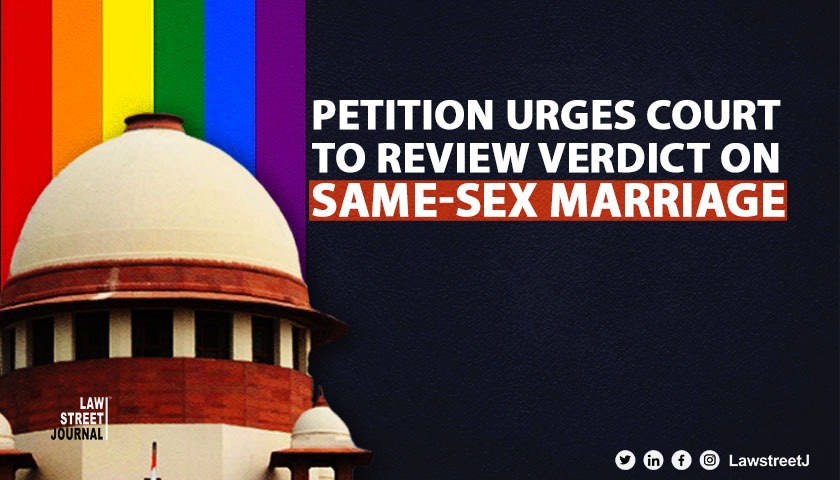NEW DELHI: A review petition has been filed in the Supreme Court against October 17 judgement by a five-judge Constitution bench declining to grant legal recognition to the marriage of same-sex couples, saying it overlooked that the legislative choice treated homosexuals as sub-par humans.
The plea filed by Udit Sood, one of the petitioners, contended that the judgment suffered from errors apparent on the face of the record and was self-contradictory and manifestly unjust on in its understanding of "marriage".
"The majority judgment effectively compels young queer Indians to remain in the closet and lead dishonest lives if they wish the joys of a real family. It is fallacious that, under these facts, and in the absence of a fundamental right to marry or form a union, the rights to equal protection, dignity and fraternity are insufficient to justify judicial intervention," the plea said.
It also said the judgement acknowledged that the Special Marriage Act, 1954 conferred the "status" of marriage, observing that the Act "in fact created social status or facilitated the status of individuals in private fields" and that the Parliament "has intervened and facilitated creation of social status (marriage) through SMA."
However, the ruling then rests on the opposite premise-namely, that the terms of marriage are largely set independently of the state and that the status of marriage "is still not one that is conferred by the state", the plea said.
"The majority judgment overlooks that marriage, at its core, is an enforceable social contract. The right to so contract is available to anyone capable of consenting. Adults of any faith-or no faith-may engage in it. No one group of people may define for another what "marriage" means. No contract, nor forceful State action like imprisonment, may curtail an adult's fundamental right to marry," it said.
The petitioner further said the majority judgment warranted review because it summarily disregards the foregoing authority to make the chilling declaration that the Constitution guarantees no fundamental right to marry, found a family, or form a civil union.
"The majority judgment is manifestly unjust because it countenances animus-motivated depravation of the petitioners' fundamental rights. And yet, it overlooks that the legislative choice herein treats homosexuals as sub-par humans" the plea said.
In its decision, the top court had declined to grant legal recognition to the marriage of same-sex couples. However, it did uphold their right to cohabitation without any threat to violence and interference and also sought to debunk the notion that homosexuality was an urban, elite concept.
The judges were divided on the issue of civil unions (akin to marriage) and adoption by same-sex couples, and in a 3:2 judgement ruled against both, while noting that marriage laws can't be seen in isolation.
The plea said the majority judgment neuters this Court's jurisdiction, holding that while "recognition" of discrimination and violation of the petitioners' fundamental rights "is this court's obligation, falling within its remit" (Ref opinion of Justice S Ravindra Bhat), separation of powers prohibits this Court from enjoining the discrimination or otherwise protecting those fundamental rights.
"It is submitted that this is an error apparent on the face of the record and an abdication of the duty entrusted to this Court by the Constitution of our country. Our Constitution primarily tasks this Court-not the Respondents with upholding fundamental rights.
"This court has no more important function than to preserve the inviolable fundamental rights of the people, as per Smt Ujjam Bai vs State Of UP (1963). To find that the petitioners are enduring discrimination, but then turn them away with best wishes for the future, conforms neither with this Court's Constitutional obligation towards queer Indians nor with the separation of powers contemplated in our Constitution," it added.
















